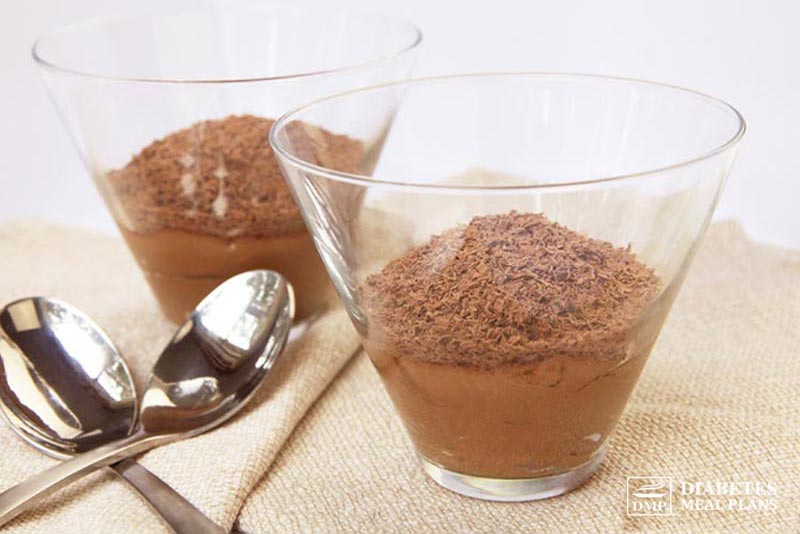Nothing beats that fluffy-yet-dense texture of cheesecake.
The ingredient responsible for this ultra-creamy, irresistible dessert is cream cheese!
So, let’s talk about it.
Is cream cheese a good option for diabetics to eat?
And more importantly, can you use it to make a mouth-watering diabetes-friendly cheesecake?

What is Cream Cheese?
Cream cheese is a soft, spreadable cheese made by mixing cow’s milk with cream.
It can be used in a variety of recipes, both savory and sweet, due to its mild tangy-yet-sweet flavor.
It’s often used to add richness to baked goods, cakes, and frostings. Most famously, cream cheese is spread across a toasted bagel for breakfast or a snack.
While we don’t recommend any of the high-carb combos we just mentioned, that doesn’t mean you can’t enjoy the wonders of cream cheese on a low carb diet.
Stick around until the end for a few diabetes-friendly desserts that are guaranteed to please!
Cream Cheese Nutrition Facts
Here’s what’s in 2 tablespoons or 1 oz (28g) of plain cream cheese:
- Calories: 100
- Total Fat: 10g
- Saturated Fat: 6g
- Protein: 2g
- Total Carbs: <1g
- Fiber: 0g
These days there is a whole slew of cream cheese options, ranging from spicy jalapeno to sweet an fruity (and everything in between).
Let’s compare the nutrition fats for a few options from a popular cheese brand: Philadelphia Cream Cheese.
Cream Cheese Nutrition Comparison Chart

The original “brick” of plain cream cheese has the lowest carbs (basically zero) and the highest amount of fat. Being unflavored and unwhipped, it also contains the fewest ingredients.
It contains just 5 ingredients: pasteurized milk and cream, salt, carob bean gum, and a cheese culture.
Some of the other options contain ingredients like modified food starch, added flavoring, food dye, and other binding agents and preservatives.
These ingredients aren’t harmful (especially in such small amounts) but it’s always good to know what you’re actually eating! If you’re looking for the “cleanest” option, go for the original plain cream cheese that comes in a brick.
Now, what everyone with diabetes should really look out for is excess carbohydrates found in many of the sweet, flavored varieties. These carbs mostly come from added sugar and fruit puree.
And while just 6 or 7 grams of carbs per serving (2 tablespoons) may not seem like a lot, those carbs can add up quickly, especially if you don’t keep a watchful eye on your serving sizes.
Full-Fat Dairy: To Eat or Not to Eat?
Full-fat dairy can be a hot topic in health and diet circles.
To eat or not to eat it? That is the question.
The answer is: yes, you can choose to eat full-fat dairy!
There’s no scientifically-based reason to be wary of it.
When it comes to dietary fat, people are usually concerned about saturated fat contributing to clogged arteries and heart disease.
You may be surprised to hear it, but research on diabetes has actually found no major benefit to reducing dietary fat intake.
Some studies even concluded that eating full fat dairy was a protective factor against developing type 2 diabetes!
And when we compare the benefits of a low carb versus a low fat diet for managing diabetes, there’s just no competition!
Focusing on reducing carbs rather than fat can result in:
- Lower blood sugar
- Improved insulin sensitivity
- Lower “bad” LDL cholesterol but higher “good” HDL cholesterol
- Increased weight loss
The only fats you should actively limit are the cheap, pro-inflammatory vegetable oils and trans fats you’ll find in highly-processed junk food.
Want to hear another benefit of fat?
Dietary fat contributes to a feeling of fullness (satiety) after eating, so you may want to choose full-fat dairy if you find yourself getting hungry between meals throughout the day.
To top it all off, fat has a stabilizing effect on blood sugar levels, especially when combined with protein in foods like cream cheese. You just can’t go wrong when you pair a healthy fat with a protein: that’s a recipe for stable all-day energy!

Best (and Worst) Cream Cheese for Diabetes
According to the research, full fat dairy is here to stay!
When choosing between full fat or reduced-fat cream cheese, it’s all down to preference.
Reduced-fat dairy is fine, but be sure to check the label to make sure that fat hasn’t been replaced with extra sugar (this is a common trick to maintain the flavor in “low fat” products).
The “best” cream cheese is one with the fewest ingredients, additives, and sugars.
The flavored cream cheeses shown earlier aren’t necessarily in the “no” category as long as they don’t contain a bunch of added sugar. We don’t recommend going over 3-4g of carbs per serving.
What’s the worst cream cheese option?
You may know the answer already – the worst ones are the “junk food” options laden with dyes, artificial flavors, and, of course, added sugar!
These are typically fruit or dessert flavored, but if you can’t tell just by the front packaging, turn the item over and take a look at the ingredients list and the nutrition facts label.
Cane sugar (sucrose), brown sugar, syrup, fruit puree, honey, fructose, and molasses…these are different types of sugar that may pop up on an ingredients label.
Now let’s get to the tastiest part: delicious recipes that revolve around cream cheese!



Ways to Use Cream Cheese
We’ve got a few sweet and savory recipes where cream cheese is the star of the show. Enjoy!
Decadent Desserts
We promised a decadent, sugar-free, low-carb cheesecake, and we’re going to deliver!
For a diabetes-friendly version of a classic dessert, try our creamy, stevia-sweetened Cheesecake recipe.
Savory Selections
Savory dairy items like plain Greek yogurt, feta, or goat’s cheese can easily be swapped for cream cheese in some recipes.
You can also add cream cheese to some recipes that didn’t contain dairy at all, to amp up the creaminess!
Here are some ideas:
- Add a few spoons of cream cheese to a breakfast favorite like a veggie omelet, egg muffins, or a scramble
- Mix cream cheese with fresh herbs, sour cream, and onions for a fun veggie dip or use it to replace yogurt in a standard vegetable dip recipe
- Replace mozzarella cheese with a few dollops of cream cheese
- Add some cream cheese to pasta sauce for a restaurant-level dinner
**Achieve lower blood sugar, A1c, weight and reduce medications




Leave a Reply